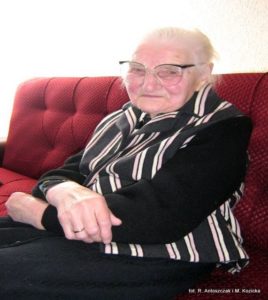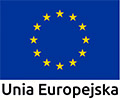The Righteous from the Treblinka area - Apolonia Kret

Apolonia Kret (Sister Benedykta) is a cheerfully disposed person. Although she is over ninety years of age, she is still interested in events related to our country. She keeps up to date with the newspapers and loves literature. The other sisters call her “walking history”.
Can you tell us about your childhood?
I was born in 1919 in Garwolin. My father believed that farming was the only way to make a living. There were eight children, 7 girls and one boy. There were four-department schools at that time. Upon graduation, one went to the agricultural school with the 5th, 6th, 7th grade with dormitory. It was near Łuków. My brother graduated from the school. I was there for only a year, because the dormitory got closed. My father sent me to live in digs in Garwolin where I finished school. I didn’t like working on the farm, but reading and embroidery. My father bought a sewing machine, so I had to learn how to sew. As a result, father went to a priest who said that such a school was located in Skórzec with the nuns. The priest wrote a letter to Mother Superior asking her to accept me to the sewing school. And so I found myself in Skórzec. I was 17 years old when I and my older sister visited Skórzec.
How did the call to the congregation of nuns proceed?
I imagined nuns walking in bags. I was surprised to cross the threshold of the Convent, seeing ladies in aprons. I thought they were maidservants. But I was wrong. They were nuns. After arrival, I was directed to the sewing workshop, where Mother Superior greeted me. I remember she said “God bless you” to me and I spontaneously kissed her hand. To this day, my behaviour is still surprising to me, because nobody taught me this. For three years of my stay I got used to this place, missed my family home, but the time was filled with various activities, such as performances, setting up circles, and in the evenings we made knitwear, during which my sister read the book to us. And so my fate was connected with the Convent of the Daughters of the Most Holy Heart of the Blessed Virgin Mary called “sercanki”. My service began in Skórzec. I was there for thirteen years. I spent six years in Nowe Miasto. Then, my fate was connected with Wereszczyn. I was there for thirty years, where I was involved in knitting. I returned to Skórzec in 1994 and I will stay there until my death.
What is the story of hiding Basia and Jadwiga Górska (the real name Faktor)?
I don’t know who brought the girl to Skórzec. One of the sisters wanted to settle matters in the municipal office, where an elderly man started shouting at her. Mother Superior saw the scene and ordered to bring the girl to the Convent. Only Mother Superior Bronisława Hryniewicz, Stanisława Józwikowska and myself (Apolonia Kret) knew of the secret. None of the other sisters knew that the girls were Jewish. They were students for them. We lived under one roof with Germans, so everything had to be kept strictly secret. We had to be very careful. When Basia was brought in, her appearance brought us to tears. She looked horrible. She had lice everywhere and her body was covered in scabies. She had sores on her back, chest and legs. The first thing to do with the poor nine year old child was to give her a bath and then cut her hair. I bathed her every day, applied ointment and changed her sheets. Yet there were still lice. It took three weeks for her to recover. I remember when she got up and sat at Mother Superior’s room and sang: w garwolskim powiece stała się nowina, bo się zakochali chłopiec i dziewczyna, jak się zakochali tak się miłowali tylko im rodzice pobrać się nie dali… Years later I asked where she learned the song. She said that from the ghetto they had escaped from. She said that her brother Janek and sister Halinka were murdered in front of her. During Basia’s long stay in Skórzec, she mentioned her older sister, Jadzia. Mother Superior ordered her to be brought to the convent, so that they would be together. We also knew about another sister Regina, who probably was in Gołąbek, but nobody saw her.
What kind of child was Basia?
She was a good student. She finished two classes a year. She was a lively child and did not cause any difficulties. When Basia reached the appropriate age, she had to be prepared for the First Communion. She was prepared by sister, the head of the workshop. The Sister asked her, Basia, do you understand what I’m explaining – that if a person is not baptised, they cannot receive any another sacrament? She replied that she understood. She never revealed that she was Jewish and the Holy Communion ceremony took place in the chapel. Prior to Easter, Mother Superior went to Warsaw to look for a birth certificate or baptismal record. No one had heard of the girl there. She had claimed that her parents were buried in Wawrzyszew. Unfortunately, Mother Superior found nothing there also. Upon her return to Skórzec, we talked about it. Surely, somewhere in Poland, there has to be a document confirming the girl’s existence. We asked her directly, Tell us, are you an Israelite? Basia hugged me and admitted that they were Jews. I then said to her, Basia, why didn’t you tell us this earlier when we asked you prior to preparing you for communion?, to which she replied: Jadzia said that if we admit that, they we would be killed. She had received the sacrament of the First Communion, but she was not baptised. We had to baptise her. Mother Superior went to Kotuń under the pretext that she was going to the doctor. She heard that the priest baptised all Jews there. Basia was baptised. Mother Superior was her godmother, and the priest who gave her the sacrament was her godfather. After some time Jadzia was also taken to Kotuń to be baptised. Sometime after that event [after the war – the footnote of the Museum of Struggle and Martyrdom in Treblinka] I was sent to the curia in Siedlce for the liturgical calendar for the new year, which was in the garrison church. I got the calendar from Mr Michał, who told me that we were harbouring two Jewish girls. I was terrified and I denied saying that he was talking nonsense, but he only smiled and said firmly, I know that you are hiding Jewish girls…. I rushed back to the Convent and told Mother Superior about this incident. I went to the chapel to pray not to think what might happen. We were restless. Our fears turned out to be right. A woman and two men came. She claimed to be her aunt. Basia shouted that she didn’t want to go and that she didn’t have any aunt. She held on to the Sister’s skirt. Mother Superior said that she would not give the child back, but the woman said that they would take her away even against our will. They put money on the table for the girl’s upkeep. We didn’t accept them because we didn’t raise the girls for money. This was emphasised by the president during the award ceremony. The girls were taken away. Mother Superior was anxious because she was afraid that they were taken away to trade in them. The first news from Basia came from Zabrze. In the letter she asked for memorabilia from the First Communion, a holy picture, a prayer book. Later, when writing from Palestine, she complained that at the border she had been taken away all the memorabilia testifying that she was a Christian.
How did it happen that you received the award?
Basia submitted us for the “Righteous Among the Nations” award. She wrote twice a letter asking for Sisters Bronisława Hryniewicz and Stanisława Józwikowska to receive the award. As the only survivor who witnessed these events, I was honoured with this award on 15 May 1995. Unfortunately, Basia, who was supposed to be with me on that day, was missing at the ceremony. Her personal problems did not allow her to come.
Do you maintain contact with Basia?
She writes letters from time to time. She used to come to Skórzec. Basia wanted to return to Poland, but she encountered a number of difficulties. During her visit in 2002, she made an entry in the memorial book thanking for taking care of her.
Text and photos by: Renata Antoszczak and Małgorzata Kozicka
The interview was conducted in May 2009.





